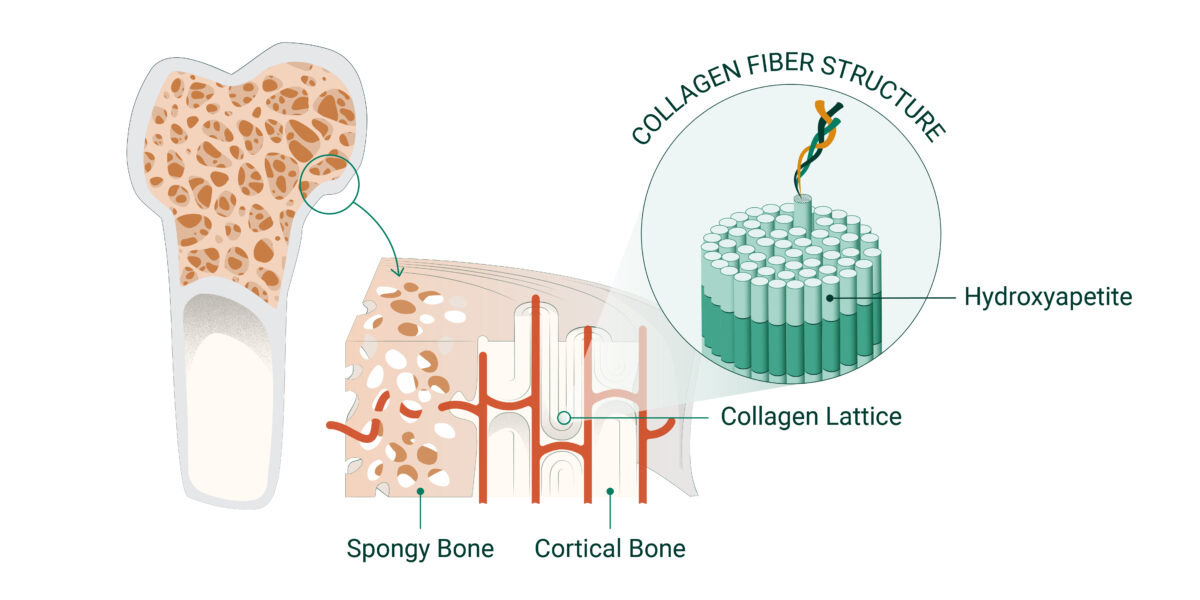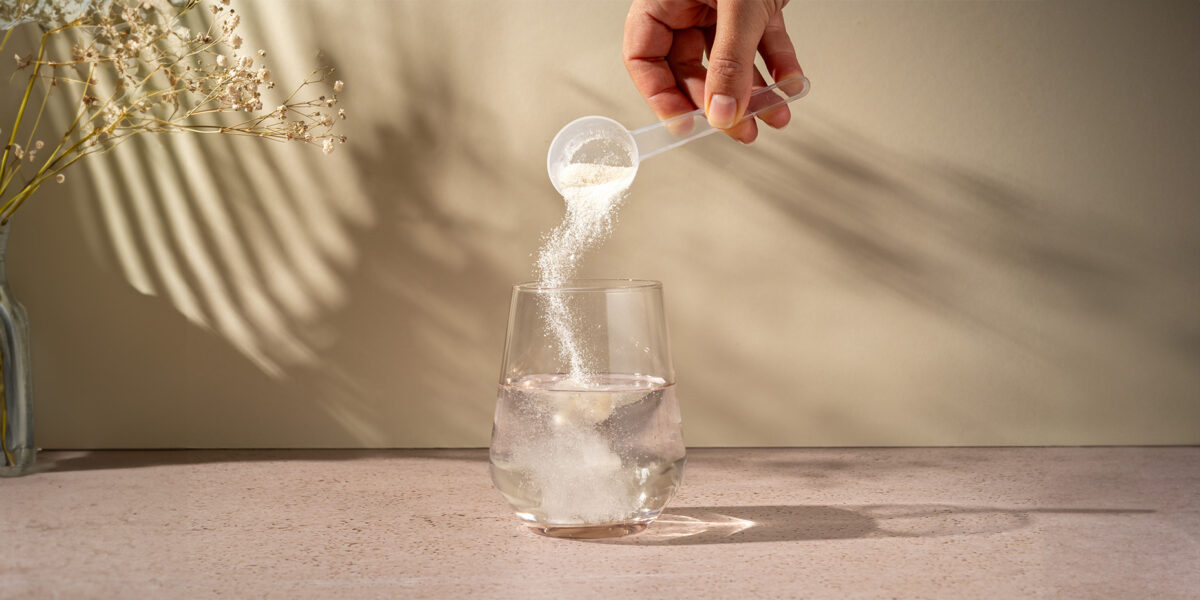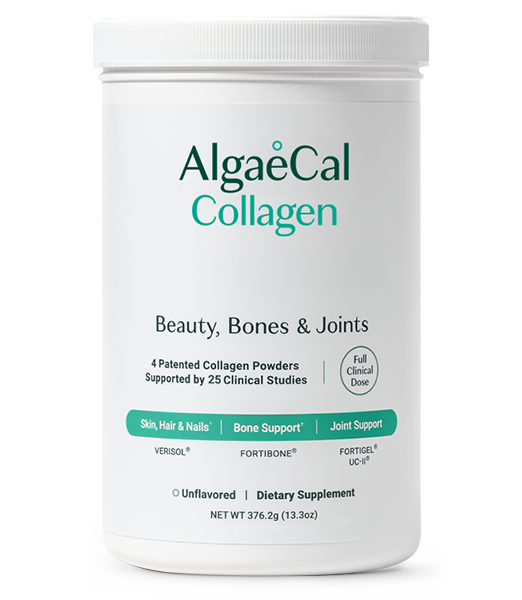Most people know collagen is excellent for skin, muscles, and connective tissues. But what’s less well-known is that collagen is essential to healthy bone. It’s true! Collagen acts like a building frame inside your bones, providing them with structure and the ability to withstand everyday stress. Moreover, it makes your bones flexible, so they can absorb shocks and reduce the chance of fractures.1
Pretty impressive, right?
The only problem is that as we get older, our bodies produce less collagen, making our bones weaker and weaker. This is why taking collagen supplements becomes particularly beneficial as we celebrate our 40th birthday and beyond.
How Collagen Supports Bone Health
At the core of your bones is a lattice of collagen fibers. Think of this collagen lattice as a scaffold where minerals can embed themselves, contributing to bone strength and structure. Once this scaffolding is in place, hydroxyapatite (a mineral complex made primarily of calcium and phosphate) deposits into the spaces between the lattice framework, creating solidity and structure in your bone tissue.2,3

That’s why collagen is the bedrock on which your bone is built. In fact, healthy collagen levels in your bone tissue are essential to maintaining – and improving – your bone mineral density.4
But collagen is more than a lattice framework for your bone minerals. It’s also directly involved in the growth of bone tissue. Specifically, collagen assists in the differentiation and proliferation of osteoblast cells (the cells responsible for bone growth). By regulating the function of these essential cells, collagen signals your body to begin forming healthy new bone tissue.5
Why Collagen May Be The Missing Link In Solving Osteoporosis
Collagen supplements can help target the root cause of osteoporosis, according to research.6
Osteoporosis happens when your body breaks down more bone than it rebuilds, leading to bones that are weak and easily breakable. Imagine your bones are like a building being constantly renovated: old parts are torn down, and new ones are built. As you get older, more of the building gets torn down than rebuilt, which is why your bones get weaker over time, especially after you’ve reached your 40th Birthday.7,8
That’s why researchers are so excited about the potential of collagen supplementation to help prevent osteoporosis.
In one study, 131 postmenopausal women were given 5 grams of collagen per day or a placebo for 12 months. The investigators examined changes in the femoral neck (where the thigh bone joins with the hip bone), an area particularly vulnerable to osteoporosis. After 12 months, the women in the treatment group showed improved bone mineral density and increased bone formation in the femoral neck. The study authors also reported favorable shifts in bone markers, indicating a reduction in the rate of bone loss.9
In a follow-up study four years later, the participants showed that with consistent collagen supplementation, their bone loss continued to slow down, with many reporting an increase in their bone mineral density. Furthermore, none of the participants who continued the collagen supplementation experienced fractures during the four years.10
In another study, postmenopausal women with osteopenia (a precursor to osteoporosis) were divided into two groups. One group was given a calcium, vitamin D, plus collagen supplement. The other group was given a calcium and vitamin D supplement with no collagen.
At the end of the study, the collagen group showed lower reductions in bone mineral density than the calcium-vitamin D group and significantly reduced blood markers for bone breakdown.11 In other words, their bones were stronger with collagen!
Collagen Boosts Workout Bone Benefits
Collagen supports strong muscles, which can help ward off osteoporosis. Here’s how it works: during weight-bearing or resistance exercises, your muscles apply pressure on your bones. This pressure signals your bones to grow stronger, getting them ready for more activity.

This muscle-bone interaction is a key reason why regular exercise is essential in preventing osteoporosis; it’s like your muscles are coaching your bones to bulk up.
And that’s where collagen helps. Stronger muscles, supported by collagen, can exert more force on your bones during exercise. This increased force encourages even more bone growth, creating a cycle of strengthening that’s beneficial for both your muscles and bones. So, in a way, collagen helps to amplify the bone-strengthening effects of your workouts.
Studies have found that taking collagen supplements can improve muscle strength and increase muscle mass.12 And that’s not only for young, fit people; it works for older adults too! For example, one study showed that older men with sarcopenia, a condition where you lose muscle mass, saw big improvements. They gained more muscle without the fat, got stronger, and their muscle control got better, all thanks to adding collagen to their routine.13
To boost your body’s collagen, consider adding bone broth, a nutrient-dense liquid made by simmering bones, to your diet. Fish, particularly their skins, are another excellent source, with varieties such as salmon being particularly rich in collagen. Chicken, especially its skin and connective tissues, also provides a significant amount of collagen. Lastly, egg whites, while not containing collagen themselves, are packed with proline and glycine – amino acids that are vital for collagen synthesis in the human body, supporting the body’s natural collagen production process.
But to ensure consistent collagen levels, many people find supplementing helpful alongside these dietary choices. While bone broth, fish skins, chicken parts, and egg whites are excellent natural sources, daily supplements can provide a steady supply of collagen, especially on days when your diet might not cover all your collagen needs.
How Should You Take Collagen Supplements?
To get the most out of collagen supplements, it’s best to take them daily. They usually come as a powder, which is great because you can easily mix them into your drinks like water, smoothies, or even your morning coffee or tea. This can become a handy daily habit to help you remember to take it. Just a tip: avoid mixing it into very hot drinks, as it might not blend well.

You can also stir collagen into foods that have a liquid consistency, such as yogurt, applesauce, soups, or oatmeal. It’s really up to you.
Since collagen doesn’t give you a buzz or keep you awake, you can take it at any time that works for you, whether that’s in the morning or before bed. The key is to take it when you’re most likely to remember.And while collagen is great for your bones, you don’t have to take it at the same time as calcium. But do make sure you’re also getting enough calcium each day, ideally in a supplement that includes all 16 of the nutrients that are clinically supported to increase bone density.
AlgaeCal Collagen
We launched our very own collagen supplement. We’re calling it AlgaeCal Collagen.
AlgaeCal Collagen is packed with all the above four powerful collagens—Verisol®, Fortigel®, UC-II®, and Fortibone®—each with clinically supported benefits for skin, hair, nails, joints, and bones. In each serving of this advanced multi-collagen supplement, you’ll receive the clinical doses whose benefits were confirmed by 25 studies, 18 of which were double-blind, placebo-controlled trials. This ensures you get comprehensive support, from the hair on your head to the tips of your toes. Plus, it’s unflavored and dissolves easily into any hot drink, making it a convenient and versatile addition to your daily routine.
Takeaway
Collagen is key for keeping your bones strong and healthy. Even though exercise and eating right are important for your bones, giving your body the right building blocks, like collagen, makes all the difference.
Collagen does more than just act as a support structure in your bones; it also helps make osteoblasts, the cells that build new bone, and strengthens your muscles. This makes collagen a triple booster for building strong bones.
For the best care of your bones over the long term, consider combining collagen with a supplement that includes all 16 clinically supported nutrients for stronger bones. This way, you’re giving your bones a complete package of the necessary nutrients.
Sign up for the AlgaeCal Newsletter to stay in the loop on the latest in bone health and healthy aging.
FAQs
Is taking collagen good for osteoporosis?
Studies show collagen supplementation may enhance bone mineral density and slow bone loss. Therefore, osteoporosis patients would likely benefit from a collagen protein supplement.
Can collagen raise calcium levels?
Collagen won’t raise calcium levels unless you take a collagen supplement containing calcium.
How can I increase my bone density after 60?
Several factors can contribute to bone density after age 60, including physical activity (particularly weight-bearing exercise) and targeted nutrients. Some of the most well-studied and beneficial nutrients for bone density include calcium, vitamin D, vitamin K2, and collagen.
Can Collagen Prevent Osteoporosis?
Research suggests collagen supplementation helps stimulate osteoblasts (bone-building cells), potentially preventing osteoporosis and reducing fracture risks.
What Type of Collagen is Best for Bone Health?
Type I collagen is the primary type found in bones and is crucial for maintaining bone strength and flexibility.
How Much Collagen Should I Take for Osteoporosis?
Studies recommend 5 grams of collagen daily for at least 12 months to see improvements in bone density.
Is Collagen Alone Enough for Bone Health?
While beneficial, collagen should be combined with calcium, vitamin D, and weight-bearing exercises for optimal bone strength.






Celeste L Filbert
May 15, 2024 , 8:39 pmLearning more about collagen and how it helps many things including bone density which I wasn’t aware of. I’m now adding it to my daily routine. Thank you for all the wonderful information that is helping me get stronger bones!